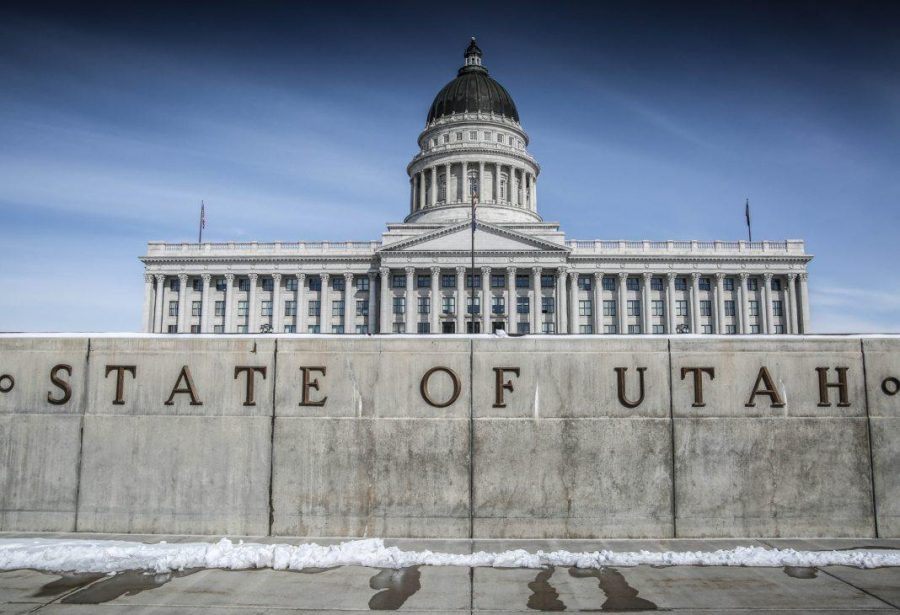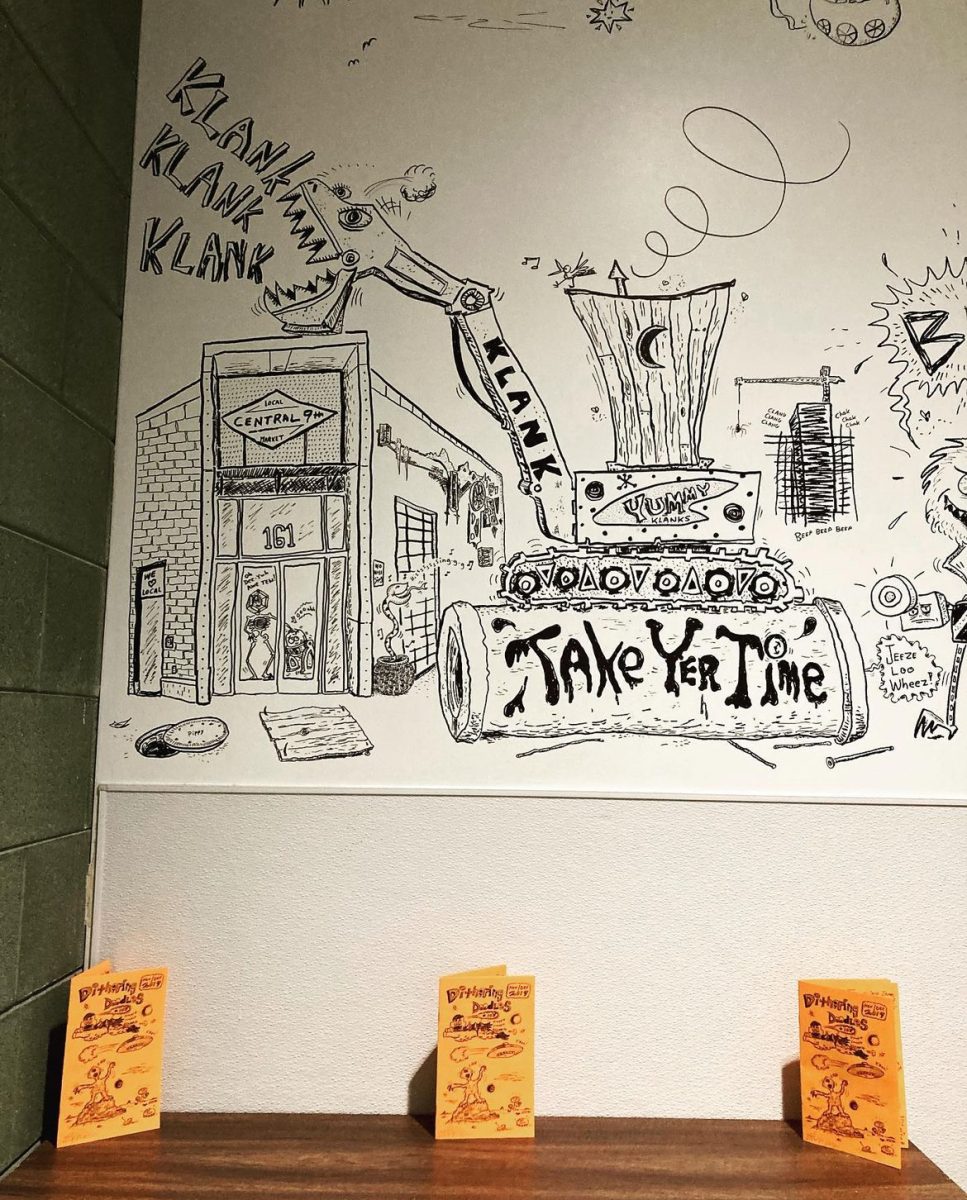Scott: We Can’t Honor Women from Utah’s Past Without Hard Conversations About the Present
Utah State Capital In Salt Lake City, Utah on Wednesday, Feb. 21, 2018. (Photo by Cassandra Palor | Daily Utah Chronicle)
November 18, 2020
At seven feet six inches tall, the likeness of Martha Hughes Cannon towers temporarily within the Utah State Capitol. The pandemic has complicated plans to install the statue of the first female state senator — who was also a physician, suffragist, polygamous wife and immigrant — in the U.S. Capitol, becoming the tenth woman in the collection. The silver lining is that Utahns may have some time to enjoy Martha to themselves and hopefully introduce younger generations to an accomplished leader who helped shape our state’s early history.
I remember going up to the state capitol in 2018 to watch the legislature vote to send Martha to Washington. I crammed myself into the House gallery with a crowd of women wearing various combinations of white, purple, gold and green. Legislators were at work on the floor, many — but not all — of them wearing yellow roses to indicate support for the new statue. The excitement in the chambers was palpable after the legislation passed, and I remember my then-freshman self feeling quite optimistic about potential future gains for women. Everyone was so happy, grinning and shaking hands throughout the room — what could this mean but more change on the horizon?
My wild idealism has regulated since then. Two years of non-stop schooling, government internships and volunteering for political campaigns brought me back to the reality of womanhood in Utah. A few weeks after watching Martha’s victory, a professor leveled me with his answer to my question about discrimination in the workplace. I had asked how one might uncover subtle sexism in the legal profession, as a hostile workplace environment is difficult to prove, and I figured most attorneys were too careful to leave damning paper trails lying around. “On no,” he replied brusquely. “You will absolutely and openly be discriminated against by some of your colleagues. There are still attorneys out there who will not even be comfortable meeting over lunch because you are a woman.”
It was frustrating to realize that the same professional culture that was so excited to send Martha to Washington might not even be willing to send me to an important lunch. And while my professor’s response rattled me, I learned to appreciate his candor. I didn’t know it at the time, but it prepared me for a variety of experiences ranging from sexual harassment to blatant verbal disrespect in otherwise “professional” environments. It validated my anger every time I saw a male legislator openly condescend to his female colleagues, many of whom were my role models. And it helped me keep a sense of humor through truly bizarre interactions of my own — such as recently, when a male colleague painstakingly explained the different types of campaign yard signs and how to put them into the ground, bulldozing straight past my gentle interjection that I had worked on five campaigns over the years and could probably figure it out.
While that story is so ridiculous as to be legitimately funny, it’s also incredibly sad. It happened shortly after I was awarded the premier graduate fellowship in the United States for public service, a tremendous honor — and yet our conversation reminded me that, at the end of the day, I still look like someone who can’t be trusted to hammer in a lawn sign correctly. And it’s because I am a woman.
I’m ashamed to admit it, but there was a minute when it got to me. A 2019 poll reported that more than half of Utah women believe that they have a lower status than men (primarily based upon the gender wage gap and strict gender roles) and I think I momentarily regressed into that belief. I thought about how frequently I received negative messages in socially progressive spaces that talked a big game about supporting women and how little they differed from those in spaces that did not. I felt nervous about whether my opportunities would be limited and wondered how I could have a sustainable career filled with that feeling. Unfortunately, I knew that I am not alone in these fears.
I recently read a Utah Business article by a woman who heard a respected and established (and anonymous) business leader announce that “women aren’t valued for their careers in Utah.” His amendment that “women are valued much more highly here than in other places… just not for their careers,” did nothing to mitigate his effortless invalidation of the women in the room. Entrata CEO Dave Bateman created a similar mess last year at the Utah tech community’s third annual conference, when he treated female tech industry engineers, entrepreneurs and managers as if they were a gaggle of dippy fangirls. What does it say about Utah’s work culture at large that business leaders feel comfortable going on stage and insulting a crowd of women to their face?
A 2017 op-ed written by James Green, vice-chair of the Wasatch County Republican Party at the time, (unintentionally) sheds light on the issue. Green argued that “If businesses are forced to pay women the same as male earnings, that means they will have to reduce the pay for the men they employ,” calling it a “vicious cycle that only gets worse the more equality of pay is forced upon us.” Few people have beliefs as extreme as Green’s, but we are all exposed to them, vulnerable to how they shape our view of women’s skill and ambition. If this does not change, women will continue to be treated as auxiliary, lesser and even inconvenient — despite our diversity trainings, glossy “women in __ conferences” and bronze statues.
“For too long, the lives and accomplishments of women have been forgotten or overlooked,” said Sen. Deidre Henderson, co-chair of the Send Martha oversight committee. “When we forget where we come from we can’t properly understand where we are and we’re ill-equipped to know where we’re going.”
We need to “properly understand” the magnitude of ranking dead last in the nation for women’s equality. It’s bittersweet to celebrate a victory for a bronzed Martha when Utah’s women are continually stonewalled by limited political representation and the worst gender wage gap in the country. We should absolutely consider Martha’s path to Washington to be a victory, but how we treat women today will determine whether it is more than a symbolic one.








